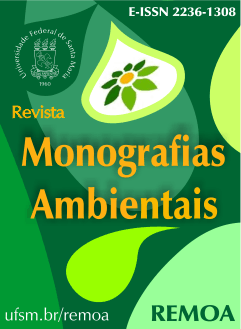Central sorting waste (CSW): a solution for the management in small cities
DOI:
https://doi.org/10.5902/2236130810930Keywords:
Solid urban wast, Small cities, Municipal waste managementAbstract
In Brazil, the solid urban waste (SUW) is still deposited in irregular places. Some management strategies can change this scenario, as the reduction in the generation and recycling of materials, with the consequent disposing in landfill only the tailing. Small cities present financial and technical difficulties in constructing and managing landfills. The central sorting waste (CSW) constitutes a viable solution considering the possibility to improve the segregation and evaluation of materials. The sorted material is forwarded to recycling or disposal in landfill. According to the National Solid Waste Politics, Law 12,305 (BRAZIL, 2010) this solution can be associated. The presented context motivated the current work which was conducted in partnership between UFSM and FEPAM Santa Maria Region/GERSEN. The objective was to develop a study to become viable the establishment of CSW in small cities. Two regions located in the center of Rio Grande do Sul State were analyzed in order to know the generation profile of small cities. Each of the regions was composed of six cities. The results showed that the residue derived from rural areas is essentially recyclable, since the organic fraction which is separated at source it is used to produce compost or it is mixed with animal feed. Thus, the portion collected and forwarded to the central sorting presents high utilization considering the later shipment to recycling companies. On the other hand, the residues generated by the urban population lacks of an appropriate separation, in order to reduce the waste of materials sent to landfill. This study allows us to state that the implementation of CSW reduces the municipal costs of waste management, especially for small cities, because it is an opportunity to add value to the collected fraction and to reduce the volume that would be sent to landfill. The organization of the sector from Centrals enables the implementation of selective collection programs and environmental education, as well as attending the National Policy on Solid Waste.
Downloads
References
ABELPRE. Associação Brasileira de Empresas de Limpeza Pública e Resíduos Especiais. Panorama
dos Resíduos Sólidos no Brasil. São Paulo, 2012.
BARON, Viviane. Licenciamento Ambiental de Centrais de Triagem de Resíduo Sólido Urbano. Relatório da disciplina de Laboratório de Arquitetura e Urbanismo. Universidade de Caxias do Sul. Caxias do Sul, 2010.
BRASIL. Lei nº 12.305, de 2 de agosto de 2010. Institui a Política Nacional de Resíduos Sólidos. Brasília, 2010.
CITTADIN, Leandro – Análise de critérios operacionais do aterro sanitário do Cirsures. Trabalho de Conclusão de Curso de Engenharia Ambiental – UNESC. Criciúma, 2006.
CRIVELARO, Sérgio Henrique Rezende; SOUZA, Aline Tadei; FRANCISCO, José. Pequenos municípios: a participação do dia-a-dia e a cidadania do cara-a-cara. Anais do II Seminário Nacional: Movimentos Sociais, Participação e Democracia, Florianópolis, 2007.
FADINI, Pedro Sérgio e FADINI, Almerinda Antonia Barbosa. Lixo: desafios e compromissos. Caderno temático de Química Nova na Escola, 2001. Disponível em: http://qnesc.sbq.org.br/online/cadernos/01/lixo.pdf. Acesso em: 2 mar. 2012.
FAMURS, Federação das Associações de Municípios do Rio Grande do Sul. Disponível em: http://www.famurs.com.br/. Acesso em: 2 fev. 2012.
SCHALCH, V; LEITE, W.C.A;FERNANDES, J.L.; CASTRO, M.C.A.A. Gestão e gerenciamento de resíduos Sólidos. São Carlos, 2002.
Downloads
Published
How to Cite
Issue
Section
License
Ethical guidelines for journal publication
The REMOA is committed to ensuring ethics in publication and quality of articles.
Conformance to standards of ethical behavior is therefore expected of all parties involved: Authors, Editors, Reviewers, and the Publisher.
In particular,
Authors: Authors should present an objective discussion of the significance of research work as well as sufficient detail and references to permit others to replicate the experiments. Fraudulent or knowingly inaccurate statements constitute unethical behavior and are unacceptable. Review articles should also be objective, comprehensive, and accurate accounts of the state of the art. The authors should ensure that their work is entirely original works, and if the work and/or words of others have been used, this has been appropriately acknowledged. Plagiarism in all its forms constitutes unethical publishing behavior and is unacceptable. Submitting the same manuscript to more than one journal concurrently constitutes unethical publishing behavior and is unacceptable. Authors should not submit articles describing essentially the same research to more than one journal. The corresponding author should ensure that there is a full consensus of all co-authors in approving the final version of the paper and its submission for publication.
Editors: Editors should evaluate manuscripts exclusively on the basis of their academic merit. An editor must not use unpublished information in the editor's own research without the express written consent of the author. Editors should take reasonable responsive measures when ethical complaints have been presented concerning a submitted manuscript or published paper.
Reviewers: Any manuscripts received for review must be treated as confidential documents. Privileged information or ideas obtained through peer review must be kept confidential and not used for personal advantage. Reviews should be conducted objectively, and observations should be formulated clearly with supporting arguments, so that authors can use them for improving the paper. Any selected referee who feels unqualified to review the research reported in a manuscript or knows that its prompt review will be impossible should notify the editor and excuse himself from the review process. Reviewers should not consider manuscripts in which they have conflicts of interest resulting from competitive, collaborative, or other relationships or connections with any of the authors, companies, or institutions connected to the papers.






